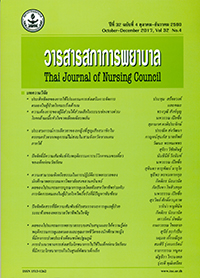Effects of a Programme Integrating Multidisciplinary Approach and Self-Management on Chronic Kidney Disease Patients with Complications
Keywords:
โปรแกรมการบูรณาการการดูแลโดยทีมสหวิชาชีพ, การจัดการตนเอง, ผู้ป่วยโรคไต เรื้อรังที่มีปัญหาซับซ้อน, programme integrating multidisciplinary approach, self-management, chronic kidney disease patient, with complicationsAbstract
Objective: To examine the effects of a program integrating multidisciplinary care
with self-management in chronic kidney disease patients with complications.
Design: One-group quasi-experimental research with a pre-test and a post-test.
Methodology: Through simple random sampling (lot drawing), the sample consisted
of 38 stage-III chronic kidney disease patients at the renal clinic of a hospital in Kanchanaburi
province. The patients participated in a 12-week programme that integrated self-management
concept, multidisciplinary care, and advanced practice nurses’ competency. This integrative
approach was conducted to comprehensively assess health problems, promote coordination,
introduce changes, organise empirical-knowledge-based educational activities, held
experience-sharing sessions based on case studies, provide reflective thinking, perform
telephone-counselling services, and pay home visits to encourage individual empowerment.
The data-collecting instruments were 3 interview forms and records of clinical outcome
assessment. The 3 interview forms were used to collect the participants’ (i) personal information;
(ii) knowledge of chronic kidney diseases; and (iii) self-management behaviour. The
records of clinical outcome assessment provided the participant’s health data, namely,
their body mass index (BMI), systolic and diastolic blood pressure (SBP and DBP),
Hemoglobin A1 (HbA1C), and Estimated Glomerular Filtration Rates (eGFR). The data
were analysed using descriptive statistics, Wilcoxon signed-rank test, and One-way
ANOVA with repeated measures.
Results: After the programme, the patients’ mean scores on knowledge and selfmanagement (13.76 ±0.68 and 112.47 ±5.19) were signifcantly higher than before the
programme. Regarding the patients’ clinical outcomes, their SBP, DBP, and HbAIC, were
also signifcantly lower, with signifcant improvement in their eGFR. However, no signifcant
change was found between the participants’ pre-experimental and post-experimental BMIs.
Recommendations: It is recommended that advanced practice nurses monitor
patients’ clinical outcomes by coordinating with a multidisciplinary team, to ensure appropriate
provision of long-term care for each patient.
Downloads
References
1. Thanakritjkru P. Current situation of chronic kidney disease in Thailand. Journal of the Department of the Medical Service 2015; 40 (5): 5-18. (In Thai)
2. Ingsathit A, Thakkinstian A, Chaiprasert A, Sangthawan P, Gojaseni P, Kiattisunthorn K, et al. Prevalence and risk factors of chronic kidney disease in the Thai Adult Population: Thai SEEK Study. Nephrology Dialysis Transplantation 2010; 25(5): 1567-1575.
3. National Kidney Foundation. About chronic kidney disease. [Online Resources updated 2016 Aug 22; cited 2017 Oct 9] Available from https://www. kidney.org/kidneydisease/aboutckd.
4. Aarayaphong J, Sumama T, Penjitti P, Chuencharoensuk G, Jongpipatvanich P, Singhalat T, et al. Service plan
guidelines for the development of the kidney disease. The Agricultural Cooperative Federation Printing of Thai. Bangkok; 2013. (In Thai)
5. Suwannapet, N. Perception of health status of continuous ambulatory peritoneal dialysis patients.
[Master Thesis of Nursing Science]. Khon Kaen University ; 2010.(In Thai)
6. Bannasitrath R, Anxity, depression, and psychosocial factors in patients with chronic kidney disease in
Department of Medical. [MasterThesis of Mental Health Science]. Chulalongkorn Univerity; 2009.
(In Thai)
7. Vejakama P, Inksatid A, Thakkinstian,A. Epidemiological Study of Chronic Kidney Disease Progression: A largescale population-based cohort study. Health System Research Institute. [Internet]. [updated 2016 Aug 12; cited 2017 Oct 12]. Available from: https://kb.hsri. or.th/dspace/handle;2015. (In Thai)93
8. Pausawasdi S, Lekhakun B, Chantarojsiri T,Theerapornlertrat T, Jimjariyaporn T, Kanjanakorn S,et al. Booklet of knowledge of kidney disease for the people. health work. Bangkok; 2013. (In Thai).
9. World Health Organization. Package of essential non communicable (PEN) disease interventions for primary
health care in low resource setting. [internet]. WHO;[cited 2016 Oct 10]. Available from: https://www.who.int/nmh/publications/essential_ncd_interventions_lr_settings.pdf
10. Seephom,S. Self-Management in chronic kidney disease. Thai Red Cross Nursing Journal. 2013; 6 (1),12-18. (in Thai).
11. Photatong, S. Effectiveness of self –management behaviors and clinical indicator among patients with diabetic nephropathy. [Master Thesis Nursing Science] Khon Kaen Univerity ; 2011. (In Thai)
12. Suwanwaha S., Wonghongkul T., Panuthai S,. Chaiard J, Effectiveness of self-management enhancement
program for Thais with CKD at pre-dialysis stages: A randomized controlled trial. Pacifc Rim Int J
Nurs Res, 2016; 20(4):320-336.
13. Jiamjariyaporn, T, Ingsathit, A, Tungsanga, K, Banchuin, C, Vipattawat, K, Kanchanakorn, S, Sitprija,
V. Effectiveness of integrated care on delaying chronic kidney disease progression in rural communities of Thailand (ESCORT study): Rationale and design of the study [NCT01978951]. BMC Nephrology. 2014; 15(1): 1-7.
14. Lorig, K. R., & Holman, H. R. Self-management education: History, defnition, outcomes, and mechanisms. Annu of Behav Med. 2003; 26(1):1-7.
15. Haj, H.I.E., Mohamed, L., Noureddine, R. Quality of care between donabeaian model. International J
Qual Res. 2013;7(1) :17-30.
16. Thungtong, S. Chinnawong, T. Thaniwattananon, P.Effects of Self-management support program for delayed progression of diabetic nephropathy on self-management behaviors and clinical outcomes in patients with uncontrolled type 2 diabetes mellitus. Songklanagarind Journal of Nursing. 2015;35 (1):
67-84. (In Thai)
17. Sumramrum, P. The effective of health belief modifcation program on food consumption behaviour of chronic kidney disease patient at pre renal replacement therapy stage. [Master Thesis Nursing Science] Chulalongkorn University; 2014. (In Thai)
18. Kammani ,T. Teaching Science : Knowledge for effective learning process. 20th ed, Bangkok Chulalongkorn
University;2558.
19. Puwarawuttipanit W, Musikthong J, Sriprasong S, Phligbua W, Kasetkala P, Srisuwan W, et al. Systematic review of chronic care model and self-management support in chronic illness. Health System Research Institute [Internet]. [updated 2016 Aug 12; cited 2017 Oct 12]. Available from. https://kb.hsri.or.th/ dspace/handle/11228/4368?locale-attribute=th. (In Thai)
20. Wright, L. M., & Leahey, M. Nurses and families: A guide to family assessment and intervention. 6th ed. Philadelphia, PA: FA Davis Company; 2013.
21. Hanucharurnkul, S. Collaboration among nursing faculties and advanced practice nurses: The professional success. Thai Journal of Nursing and Midwifery Practice.2015; 2(2): 05-17. (In Thai)








